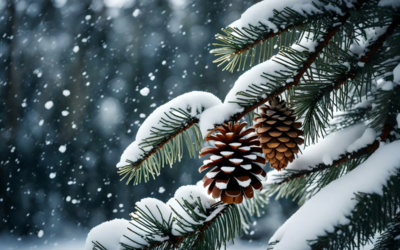Whether you cut it yourself or buy it from a nursery or lot, there’s nothing quite like a live Christmas tree to bring back memories. The smell alone is worth the price. And if you think artificial trees are more environmentally friendly than fresh-cut ones, consider this: Fresh-cut trees are a renewable resource and have much lower carbon footprint than factory-made ones.
A little preparation and knowledge will help you get a tree you’ll enjoy through the end of the holiday season. Here’s what you should know.
Christmas Tree Types
When most people picture a Christmas tree, they see a fir. Fir trees generally have short needles and thick branches that taper conically to a pointed top. But did you know that there are at least eight different varieties of fir trees sold for Christmas?
Fir Trees
- Noble Fir – A best-seller, the Noble has a thick branch structure with upturned needles that are long-lasting. It typically has dried needles close to the trunk, though, so give it a good shake before bringing it into the house.
- Frazier Fir – A Christmas favorite, the Frazier Fir is a tall, narrow tree with soft ¾ inch silver-green needles, making it perfect for corners and other tight spaces. It holds its needles longer than other trees and is wonderfully fragrant.
- Douglas Fir– This perennial favorite has soft dark blue-green needles about 1-1½ inches long. The needles radiate all around the branch, and when crushed, give off a sweet fragrance. They hold their needles well and tend to be economically priced.
- Balsam Fir – If you like a more open branch structure for your ornaments, this is the tree for you. It has a familiar, pleasing fragrance, long-lasting needles, and a uniform, open look.
- Other Firs – Other popular fir trees for holiday decorating include Concolor, Grand, Canaan and Nordmann.
Pine Trees
Pines have a look that some people prefer, and they can be less expensive than fir trees. Their stiffer branches can hold larger ornaments, and their more open structure can let you see deeper into the tree. Watch your tree carefully, though; pine needles can stay green and on the branches even when they’ve dried out, creating a fire hazard. Some pine trees are sprayed to hide their natural fall yellowing.
Popular pine trees include the Scotch Pine, White Pine, and Piñon Pine.
If you need to save room, consider a small tabletop tree. You can also buy living trees for transplanting after the holidays. Just be sure to plan for where it will be planted and prepare the ground before it freezes too deeply.
Christmas Tree Care
Besides being ugly, dried out trees present a serious fire hazard. Keep your Christmas tree beautiful and safe with these easy steps.
Choose a Good Stand
Your stand should be large enough to provide a sturdy base for the tree and able to hold enough water to keep the tree fresh.
Cut the Trunk’s End
Sap will have sealed off your tree’s trunk. Cut half an inch off the trunk’s bottom to expose fresh capillaries for water to be drawn into the branches.
Keep it Watered
Fresh-cut trees need a constant supply of water (more than a quart a day for most species). Make sure the water level never goes below the base of the tree.
Discard it Before It Dries Out
Dried needles and branches make great fuel for fires, plus they make a big mess, especially when taking down the tree. If you keep it well-watered, a tree should stay green for a few weeks, making cleanup easier. Don’t risk your family’s safety by letting the tree become a hazard.
The folks at Donovan Arborists wish you and yours a happy and safe holiday season and remind you that now is the time to get your trees and shrubs ready for winter and holiday decorating. We offer complete pruning and shearing services for Denver-area landscapes, and we’re happy to give free estimates to homeowners and property managers for any services they may need.

